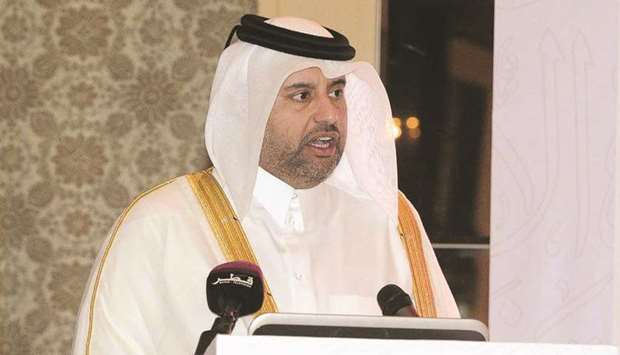Sheikh Ahmed lauds private sector lead for ‘alternative means of imports’
HE the Minister of Economy and Commerce Sheikh Ahmed bin Jassim bin Mohamed al-Thani has lauded Qatar’s private sector’s ability in finding “alternative means of imports” within a day of the imposition of blockade by some neighbouring countries.
“I thank Qatari businessmen and importers for the way they have dealt with the crisis. They have executed the plan smoothly, which reflected the high efficiency of Qatari firms and importers. It also reflected their ability in managing crises,” Sheikh Ahmed said in an interview with Qatar TV.
He noted that imports made since the crisis have all been made by the private sector, with the State not having to intervene in the process or back the market.
“The only action taken by the State in this regard was helping the private sector in finding an alternative, and in less than 24 hours the alternative products were available in Qatar. This is a testament to the ability of Qatari businessmen,” Sheikh Ahmed said.
Such a challenge created an opportunity for Qatari businessmen, he said and added, “something they know well”. As a result, he said, they provide new innovative ideas that help diversify the economy and its import sources. Those ideas also help support different industries, whether related to food security, agriculture, or pharmaceuticals.
The minister also called upon small and medium enterprises (SMEs) to take initiatives and find solutions to some of the challenges being faced due to the current crisis, expressing his belief that the siege will create “good opportunities” for businessmen in all fields.
The minister said alternative products were imported smoothly from a number of countries. There was hardly any product that did not have an alternative.
The siege provided Qatari businessmen with the opportunity to manufacture in Qatar, something which they have been “undertaking with enthusiasm”.
The minister stressed that Qatar will work with businessmen to facilitate their mission of establishing a whole new industry.
Sheikh Ahmed said the country had benefited from maintaining a large strategic reserve of food and other products, as it gave Qatar time to determine alternatives. The strategic reserve for some products is enough for a year or more. For basic materials, the minister said, many of these such as steel and cement were manufactured in Qatar. The country did not have to use any of its strategic reserves as the alternatives were available to import from.
He said some of the basic materials they found were even cheaper than the ones coming from the countries now putting Qatar under siege. The minister stressed that all of the World Cup 2022’s infrastructure projects are going as planned and not affected.
The government spending on these projects was going ahead as scheduled, and that the projects would be ready ahead of time. One of the stadiums that will host the World Cup was inaugurated weeks ago, some five years ahead of the World Cup in Qatar, he said.
Sheikh Ahmed assured all companies operating in Qatar as well as residents that the markets and flights are stable, as well as cargo. He also highlighted the establishment of two shipping routes to Salalah in Oman and in India. New direct routes will be announced in future, he added.
Sheikh Ahmed said trade in Qatar is continuing as usual and that life and conditions were unaffected.
Qatar’s economy is very well diversified and strong. Qatar is the biggest exporter in the world of LNG, GTL and helium. The country is also one of the world’s biggest exporters of petrochemicals. Nearly 70% of the country’s GDP is from non-oil sectors. Another factor is that the country’s exports were to different destinations around the globe – in South-East Asia, Asia, Europe, and the US.
The economic indicators have shown that the Qatari economy is one of the most competitive in the world. Qatar has managed to maintain its economic growth over the last 10 years despite the global and regional economic crises, Sheikh Ahmed said.
Business / Eco./Bus. News
Sheikh Ahmed lauds private sector lead for ‘alternative means of imports’ HE the Minister of Economy and Commerce Sheikh Ahmed bin Jassim bin Mohamed al-Thani has lauded Qatar’s private sector’s abil

Sheikh Ahmed: High efficiency of Qatari firms and importers.
